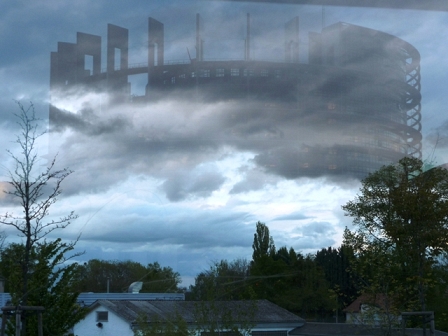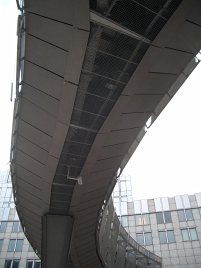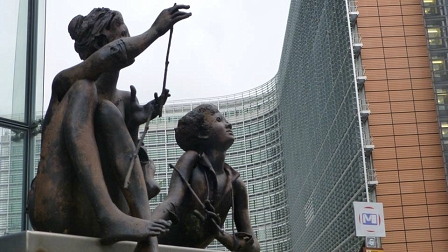Erstellt am: 11. 4. 2014 - 18:05 Uhr
Sweat, Anxiety and the Echoes of Ukraine
The numbers are mind-boggling. Between the 22nd and the 25th of May an estimated 400 million voters across the European Union's 28 members will have the chance to vote 751 Members of the European Parliament. It’s the second largest democratic process in the world, beaten only by India’s massive general elections.
And yet, apparently, instead of being awed, many of us are bored. Participation in European elections has continually dropped from a high of 62% in 1979 to just 43% in 2009 and this time round it could even hit a new low.

Chris Cummins
"This Time It's Different"
Realizing that low-turnout damages its legitimacy, the EU Parliament has embarked on a last ditch attempt to rekindle enthusiasm for the elections. There’s a new advertising campaign with the slogan “This time it’s different!” and when, in a busy Brussels corridor, I met EP Director-General for Communication Juana Lahousse Juárez, she told these were the most important EU elections in history.
“The situation in Europe has changed very visibly and very fundamentally. The economic crisis has shown that Europe is at the centre of a lot of powerful decisions and Parliament has more power than ever.”
The Power of the Populists
It is precisely that power that is propelling some Europeans to the voting booths, but not perhaps in the way that Lahousse Juárez and pro-Europeans would welcome.
In many parts of Europe, EU scepticism is dominating the run-up to the elections, nowhere more so than in Britain, where EU-opponent Nigel Farage was deemed the winner of in two fierce televised debates with pro-European deputy Prime Minister Nick Clegg.
During the heated exchanges Farage fiercely challenged the legitimacy of the European Institutions portraying the EU as an expensive club that takes power away from the people: “There will be thousands of new laws over which our own parliament and you the electorate can make no difference,” he told viewers.
Other parties, apart from Clegg's Liberal Democrats who have made a valiant defence of European Union, have been careful not to associate themselves too carefully with Brussels. It seems the political mainstream has been shocked by Farage’s sweaty barstool appeal.
In Brussels I bumped into Sky News’ Chief Political Correspondent Jon Craig and asked him why Britain was so Eurosceptic. Why are they attracted to people like Farage?
“It dates back to Margaret Thatcher’s time as Prime Minister really,” he told me. “She was always picking a fight with Jacques Delors, who was Commission President, and she made the party and country more Eurosceptic.”
Now Prime Minister David Cameron has been pushed by his own muttering back-bench party colleagues into offering a referendum on EU membership by 2017 and making promises of EU reform which, according to Craig, he is unlikely to achieve.
"It's all very symbolic"
Britain is an island with its island idiosyncrasies. The strength of anti-EU sentiment is perhaps more surprising in the Netherlands. The Dutch were founding members of the European Union and the Schengen open-border treaty. There are multilingual lot and have often been seen as at the heart of Europe. Yet in 2014 Dutch Euroscepticism is reaching record heights – mostly egged on by far-right politician Gert Wilders.
Last year a Gallup survey in early June found 39% of Dutch voters would like to see their country to exit the EU entirely.
Observers say much of Dutch scepticism is due to insecurities about identity. “It’s all very symbolic,” Martyn Van de Coy of Dutch television told me, “There’s kind of fear that the identity of the Dutch people, their language, their flag, their kingdom, is going to vanish into the whole European mix of languages and culture. Whether it is a real threat or not doesn’t matter. It is a fear.”
Compromises Are Not Sexy
Scepticism is also on the rise, according to Hendrik Vos of the University of Ghent, because of the very nature of the European Union. It is hard to find decisiveness with so many divergent interests to be considered: “European decision making is always somewhere in the muddy middle, somewhere between North and South, East and West, between the left and right- wing parties," he told me. "European decisions always have to be compromises.”
These decisions are watered down so they horrify nobody but equally satisfy nobody fully and they are easy targets for nationalist populism. But Vos urges understanding: “A lot of issues we have to tackle together, which means we have to make policies together. They have to satisfy the Brits, the Spanish and the Greeks. They are going to be compromises and compromises are never perfect. They are not sexy.”

Cummins
Fear of Russia
There is one part of Europe where interest in the implications of the elections is rising – Eastern Europe. “We thought it was going to be just enough boring EU election campaign focussed on the economy,” admitted Andreas Kuusk of Estonian television, "but after the tragic events in Ukraine, Estonia has completely new thoughts about the new challenges because we share a border with Russia."
Kuusk expects security issues and foreign policy issues will now dominate the run up to the election. “We don’t want the world to just watch on and say it is just business as usual,” he said.
Polish journalist Katarzyna Nocu agreed: “People in Poland haven’t felt that the decisions made in Brussels really affect their lives, but that has changed with the events in Ukraine”, she told me. After Russia annexed Crimea, Polish politicians have begun to talk about greater political integration, “to make Poland feel more secure in the European structures”.
In a certain way, the crisis on the EU’s eastern borders has made people see the European Union again as a political institution and not just a market place. “Politicians in Poland are even talking about whether we should have an EU military and how to act in an instable situation,” said Nocu.
So as the Brits worry about benefit-fraud, the Dutch worry about flags, many in Eastern Europe worry about Russia, and, as Nocu, points out, our European energy imports from the East. Voting for a EU parliament full of politicians believing in a strong Europe instead of a Parliament full of sceptical MEPs trying to limit the EU’s power is seen as one way to guarantee that Brussels has a strong voice on such issues.

chris cummins
If it’s to be argued that “This Time It’s Different”, maybe it is that this debate seems louder. Even if there is much disagreement, the fact that many of the decisions that affect our lives are made in Brussels is no longer been quietly shoved under the rug by national politicians. Whatever you think of Europe, we have to argue using facts not prejudice as weapons.
As Nick Clegg said when faced with polls suggesting he had been trounced in his debate with anti-EU Farage. “I wasn't going to reverse 20 years of myth-making in two hours'”.
Dieses Element ist nicht mehr verfügbar
FM4 Reality Check
Monday to Friday from 12.00 to 14.00, Saturday from 12.00 to 13.00, and after the show via Podcast or fm4.orf.at/realitycheck.


